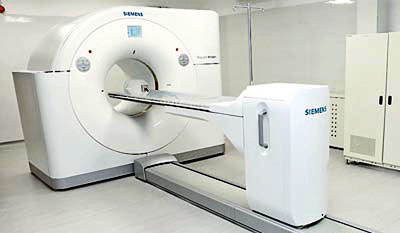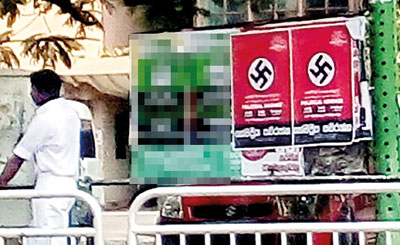Columns
Minister says officials didn’t tell him about scanners not working
View(s):Health Ministry officials were galvanised into action to ensure that spare parts and materials needed for vital medical equipment at the Colombo National Hospital were obtained after the Sunday Times questioned them about the non-functioning of these equipment.
This newspaper asked Health Minister Keheliya Rambukwella this week about the lengthy delay in repairing the Positron Emission Tomography (PET) scanner and the Computerised Tomography (CT) scanner at the National Hospital. Sources at the hospital had told the Sunday Timesthe machines had not been operating due to inaction of ministry officials in getting down spare parts and materials needed for them.

PET scanners produce detailed 3-dimensional images of the inside of the body. The machine is helpful for investigating confirmed cases of cancer.
The sole PET scanner that shows three-dimensional activity inside a person’s body stopped functioning more than two months ago after the Indian supplier of radioactive materials needed for the scanner stopped supplying due to the non-payment of bills amounting to Rs. 40 million.
Hospital sources said doctors had been warning the ministry about unpaid bills that were piling up, but no action was taken to settle them, leading to the manufacturer stopping the supply.
Around 20-30 patients are sent for PET scans at the hospital each week. With the machine no longer working, doctors had to refer patients to private hospitals, where the cost for a single scan is between Rs. 175,000 and Rs. 200,000.
Meanwhile, the CT scanner at the hospital’s accident ward has been broken for the past nine months. Doctors had met with senior Health Ministry officials over the matter. However, no effort had been made to replace it. Officials had claimed they would be able to buy a new CT scanner using funds provided from the Asian Development Bank (ADB). However, this had failed to materialise.
The hospital’s accident ward is where many of those injured due to sudden accidents in and around Colombo are taken. Given the breakdown of the machine, patients taken to the accident ward have to be transported to Lady Ridgeway Hospital, which is the closest government hospital with a CT Scanner. 
While an agreement had eventually been reached with the German manufacturer of the spare part that was needed for the CT Scanner, the machine had continued to remain inactive due to the National Medicines Regulatory Authority’s (NMRA) failure to have the consignment released from the Customs.
Mr. Rambukwella held a conference call with the relevant officials once the matter was brought to his attention. During the meeting, the NMRA was ordered to take immediate measures to secure the release of the shipment needed for the CT scanner. The spare part was delivered to the hospital on Friday.
Securing radioactive materials for the PET scanner is more complicated because the Indian Credit Line funds cannot be used to pay for it since those funds can only be used for medicines and medical equipment, the minister said. However, a decision has now been taken to settle the unpaid bills in installments using Health Ministry funds, the minister added.
He thanked the Sunday Times for drawing his attention to the issue, acknowledging that while he held progress review meetings with Health Ministry officials every two days, the matter had not been brought to his attention at these meetings.
Food for thought by Indian fisherfolk at Katchatheevu festival
This year’s annual St. Anthony’s feast at the Katchatheevu islet saw more than 2000 Indian devotees taking part after a long gap of two years due to the COVID-19 pandemic. This time, they had several complaints–among them was the quality of the food served to the devotees.
One Indian fisherfolk leader who came from Rameswaram in India noted that in the previous years, they used to talk about the food even after they returned home for its cuisine and rare taste. That was not the case this time.
Indicating that breakfast parcels of rice and dhal curry that were served after holy mass by Navy personnel were not the same as before, he said “we heard about Sri Lanka’s economic difficulties through newspapers, but now we can understand the situation even better.”
Drunken Police officers probe fatal road accident –break the laws they are supposed to uphold
Hearing recent news reports about Police excesses, one is reminded of the old proverbial saying; “the fence itself is eating the crops,” meaning those who break the laws they are supposed to uphold.
In the North, two Police officers have been interdicted and subjected to disciplinary action this week for being intoxicated while on duty. In a fatal road accident at Achchuveli where one elderly person died, the two officers turned up at the scene. To the surprise of onlookers at the tragic incident, the officers were not on their best behaviour.
The matter was raised with the Northern DIG office and both officers were subjected to medical examinations immediately, even though they maintained that they were sober. The results were positive and the two officers were interdicted.
In a separate incident, an Achchuveli Police officer was also interdicted, with pending disciplinary inquiries, under charges of possessing a narcotic substance.
Negative reports prevent National Intelligence Chief from testifying
As Sri Lanka’s 6th Periodic Review under the International Covenant on Civil and Political Rights (ICCPR) came to an end on Thursday, one senior defence official who was scheduled to take part virtually from Colombo could not do so due to negative reports about him emerging from abroad.
National Intelligence Chief Ruwan Kulatunga came under severe criticism from Tamil diaspora groups over his role during the final phases of the civil war and the post-war period in the North.
Elliot Colburn from the House of Commons in the United Kingdom also sent a letter to the United Nations Human Rights Committee saying; “The inclusion of alleged human rights perpetrators at UN meetings is not something that should go unnoticed.”
Should this proceed, he asked the Committee to question him on the allegations just as his predecessor Sisira Mendis faced at the UN Committee Against Torture in 2016.
Instead of the National Intelligence Chief, another defence official took part in the meeting and read out a statement about the queries raised earlier.
Not panicking about Adani says FM
Foreign Minister Ali Sabry who was in New Delhi earlier this week to attend an international conference defended how Indian business magnate Gautam Adani and his company found a place in Sri Lanka, saying all those deals are what he calls “government to government kind of deals.”
How well that comment sits is the question. What is the meaning of “government to government kind of deals?” Yes, the fact that the Adani Group is a close financier of Indian Prime Minister Narendra Modi is an open secret in India and elsewhere, and the Indian Government is known to use the Group to secure projects abroad as part of its foreign policy agenda but did the Sri Lankan Foreign Minister of Sri Lanka let the cat out of the bag officially?
In an interview with The Hindu, he said it was the Indian government that had identified the Adani group for infrastructure projects including the Northern Sri Lanka wind power project.
Stressing that the Government is “very, very confident” that Adani ports, airports and energy companies have strong fundamentals despite the US$ 140 billion drop in share values, after the publication of a negative report by US short seller Hindenburg, Mr. Sabry said the Adani group has already begun investing in its projects, which also include the US$ 700 million Colombo West Container Port project.
“So, we are not panicking”, he said.
Toronto District School Board to take steps to ban caste-based discrimination
Sri Lankan Tamil and Indian diaspora communities in Canada have seemingly engaged in caste discrimination among themselves and the Toronto District School Board has become the first school board in the country to take steps towards banning discrimination based on caste.
The move has attracted both passionate support and intense criticism and has divided South Asian Communities.
This week, the School Board voted 16-to-5 in favour of asking the Ontario Human Rights Commission to “assess and provide a
framework for addressing caste oppression” in public education.
In Toronto, and throughout the diaspora communities, there are “documented cases of caste-based discrimination” according to the motion submitted to the School Board. While the motion was supported by some members of the South Asian community, others had voiced concern that it may lead to ethnic profiling of South Asians.
This was not the first time the Toronto District School Board has taken decisions that could be termed as divisive. It has continued to mark “Tamil Genocide Education Week” for a number of years now, resulting in the Ontario Legislative Assembly adopting a resolution last year to recognise the event with special emphasis on what they call the “genocide” of Tamils in Sri Lanka.
Ironically, the official language of Ontario is English, unlike French speaking Quebec.

The posters for the political science classs can be seen in and around Colombo
A lesson in political science for the Master Sir
Tuition teachers are usually seen competing with each other through posters by putting their faces and their names.
However, one political science teacher in Colombo has thought of a novel, if not rather questionable way, to draw attention to his class.
That was to include the symbol used by the Nazi party of the infamous German dictator Adolf Hitler. The Nazi symbol is a tilted black Swastika in a white circle on a red background. Was he trying to copy it and got it wrong–the sacred religious Eurasian symbol of Buddhists, Hindus and Jains that represent good fortune and peace but was later corrupted
by Hitler to promote ‘white’
Aryan supremacy.
Posters bearing the design can now be seen in several areas of Colombo and its suburbs.
Buying or selling electronics has never been easier with the help of Hitad.lk! We, at Hitad.lk, hear your needs and endeavour to provide you with the perfect listings of electronics; because we have listings for nearly anything! Search for your favourite electronic items for sale on Hitad.lk today!


Leave a Reply
Post Comment